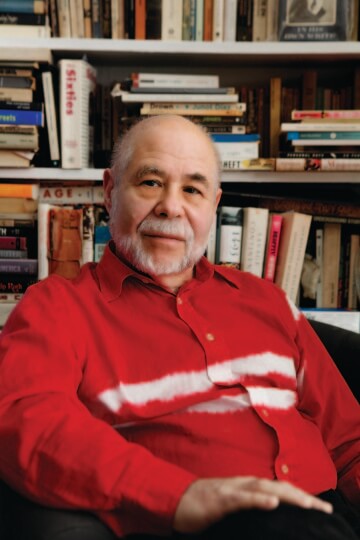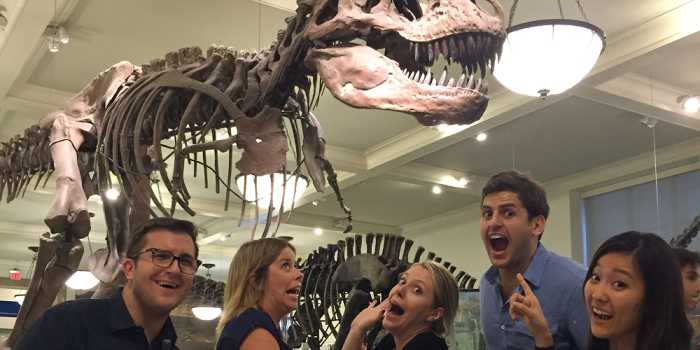Like a tightening tourniquet, a racial color line crosses the Bronx in the 1960s, whites to the north, African Americans and Latinos to the south. A pudgy, headstrong Jewish kid with long hair, a pixie smile, and Talmudic expertise with rock lyrics mans a picket line. Emmett Till’s mutilated face sticks in his head. The demand: jobs for blacks, just a click or two north of the line at, of all places, White Castle.
As he will observe, decades later, in his piquant, doleful “Another Little Piece of My Heart,” a black person could make their way about the Bronx without hassle, but groups of blacks or Puerto Ricans, let’s say, in a courtyard provoked a response as tribal as any Old World blood feud that sent the Irish, Italians, and Jews rummaging in a tool shed.
The boy’s emerging sexual awareness and sense of his own unattractiveness inform Richard Goldstein’s “deep aversion to racism. It was absurd — rock ‘n’ roll had taught me that — and repugnant.”
A rock pioneer awaits the revolution and finds it won’t come
That statement is at the heart of his memories and should clue the reader into what he will encounter in this book. From the age of 19 with Lou Reed and Andy Warhol (and his well- chronicled coterie in all their self-reverence) to his infamous New York Times pan of the Beatles’ “Sgt. Pepper’s Lonely Hearts Club Band,” and beyond, Goldstein critiqued the music that today has grandparents thumping the steering wheel during their morning commutes. Goldstein will tell us candidly how it was to meet a puke-stained Jimi Hendrix.
But this is not a rock biography.
“Race was at the core of nearly everything in the sixties,” Goldstein writes. “Even more than sitars and exotic beats, it shaped the structure of rock. Even more than the war in Vietnam, it dominated politics. Even more than LSD, it defined the consciousness of my generation.”
That is that topic that dominates his thoughts.
So, such is the case, when Richard Goldstein, son of Jewish public-housing lefties, the buttered popcorn FDR scooped up by the Loews Paradise bucketsful, stands with the Congress of Racial Equality, giving one florid grease-joint manager plenty of tsuris, or woe. (Yiddish peppers this book, not surprisingly, as does the author’s “Bronxitude.”) A white mob metastasizes, the tribal beat quickens, and a protruding arm from a car shoots a black girl in the face with a BB gun.
It is done. I break with my father, with my land, and thus become me, Goldstein declares, packing his sandals into a paper bag and hopping the el train to Greenwich Village where Dylan’s ethos hangs over the streets with the pot smoke.
This creation story is as powerful as any of the eyewitness narratives by which Goldstein recounts the birth of ‘60s pop culture, the music along with the art, social criticism, and street activism that still defines, in 2015, American culture, politics, and class.
Race and class are what the young man considers when he interviews the Doors, Janice Joplin, Bob Dylan, Andy Warhol, and the Who, among the other artists who changed music and harnessed the tectonic, vasodilating beat — by which Goldstein differentiates rock from other music — to drive millions of young citizens to the streets to protest the hypocrisy of the Vietnam war and racial oppression.
The Bronx will implode, in its own particular way, along with other large urban swaths. Detroit, Newark, Oakland, Chicago, and Philadelphia are where the real fighting occurs, for Goldstein. Khe Sanh and Hue are diversions. Fifty years later, the music Goldstein heard live is still on the radio, remastered and crystal clear, but some of those American cities never recovered.
Goldstein respected the Black Panthers, because unlike other so-called liberationist groups, they were inclusive of women, whites, and gays. As for Goldstein’s own sexuality, he marries Judith Hibbard, a classmate in journalism school, at a Manhattan discotheque, where famed DJ Murray the K presides and the Velvet Underground plays. Goldstein will have many extramarital affairs, including with men, over the next several years, but does not consider himself gay in the sense of needing to come out and declare it. He suffers from depressions, typically after a mainstream publication like Life commissions him for a piece then bastardizes it to fit mainstream tastes. He wonders early on if he is schizophrenic.
His marriage with Hibbard will not last and when Janice Joplin dies from a heroin overdose, Goldstein will plummet into his worst abyss. Maybe these mood dysfunctions were the result of an internal struggle, but Goldstein never says that. He is not on the barricades demanding equal treatment for gays and lesbians, but he does have strong same-sex attractions and acts on them with certain sultry, androgynous young men, like Groovy, whom he meets and trips with.
Today, he is married to a man. “Am I gay? More or less. Homosexual? Not only. My sexuality has always been a congeries, but I am satisfied with the shake, full of stems and seeds as it may be.”
Goldstein is typical of more men than the gay movement, perhaps, is willing to acknowledge. His early marriage, a not atypical choice for the ‘60s, even among those in the counterculture, was not a flight from self, but a reach for stability and was based on love and sexual attraction driven by the halcyon idealism and soaring lyrics of the Summer of Love.
This is not a conventional memoir. It covers just four years, 1966-70, when Goldstein pioneers the Village Voice’s rock beat. A rookie Columbia journalism school graduate, where his long hair and contrarian ways — including authoring a book about campus drug use he later discovers is CIA-financed — made him few friends, will travel the nation during the greatest domestic strife since the Civil War. (That comparison may feel worn, but it fitting for this particular memoir — Goldstein is going to groove to the music, but he is going to witness a lot of death and loss, as well.) With chutzpah, he walks into the Voice’s office and tells editor Dan Wolf he wants to be a rock critic. It is a beat no editor has heard of, but Goldstein is sent to bring in copy. In short order, he is getting review albums by the crateful from every record label in the country and the Voice bulges with full-page concert advertisements.
The New York Times and New York magazine will also feature his work, but it is the Voice, beginning with his Pop Eye column, with which Goldstein is associated.
Interviews with the greats are here in this deceptively dense 240-page book, but Goldstein packs in a lot of internal cogitation, as well. Other than a handful of them — Joplin most prominently, thus the book’s title — the book is not really about the rock stars.
In Haight-Ashbury for the Summer of Love, a theme emerges in Goldstein’s work. The young hippies and musicians are generous with a mattress and LSD, but Goldstein’s working-class sensibility begins to sniff some hypocrisy. “At first I was appalled by all this. The hippies seemed so blockheaded, so forced in their mellowness, blowing bubbles or handing me the gift of a small rubber dinosaur. I could tell from their disregard for money that they were securely middle class, while I came from a background where dropping out meant only one thing: poverty. What I saw looked dangerous and, even worse, indulgent.”
The Revolution is needed to recalibrate liberty and equality and all the mouthed truisms, but when the cops come bashing heads, these tie-dyed middle-class militants begin to look like so many poseurs with a safety net to fall into. Blacks, on the other hand, will go to prison. Poor whites, well, they take a licking, as well, and better hope a mattress awaits them wherever they came from. For Goldstein, the love commune sitting on the shining hill by the bay is a passing Eden.
He interviews the Doors on television, at a moment when the term “credibility gap” creeps from the Vietnamese jungles into the American lexicon, and thanks to YouTube, we can hear the Bronx diction and sense that hypocrisy remains in his crosshairs. Ray Manzarek lights a cigarette and makes sure Goldstein is left with more than just Jim Morrison’s rambling about the shaman.
Goldstein respects the Doors, but he’s leery of Mr. Mojo Risin’s Lizard King shtick, as are his bandmates, growing impatient with the front man’s inebriation. Guitarist Robby Krieger says European fans are more politically informed and motivated than American ones, who only want the “religious experience.” Morrison is heavily bearded in dark shades. A baby-faced Goldstein, 26, his long hair no longer than the style, wears a classic funky dress shirt and conducts a measured, cerebral examination of the group’s musical approach, wholly unlike most blather that constitutes celebrity interviews today. This interview, a huge “get” for any journalist, was yet another workaday piece in the hopper for Goldstein, by then into his third year of rock criticism.
Something he wrote in “Another Little Piece,” not about the Doors specifically, but about reckoning with his sexuality, came to mind watching the clips with the band: “The sixties were an age of faux candor, nuggets of wisdom meant to be therapeutic but actually just manipulative.” Goldstein already sees how rock has become a multi-billion dollar industry and it is the middle class driving the profits.
Goldstein makes rookie mistakes interviewing the mega-celebrities whose music was and will continue to be considered great. Early interviews with Morrison and Brian Wilson during his first California junket resolve him to more rigorously practice New Journalism, as done by lodestar Norman Mailer, with more ethical consideration, rather than simply hacking at “haunches of beef.” He explains, “Though it was hard to convey the true texture of their conflicts, it seemed essential to my role as a chronicler of the new, fragile art form that was rock.” These scruples he will reserve for true artists; the hordes of arrivistes are wasted for “fun and profit.”
At the seminal Monterey Pop festival in 1967, standing before the stage, Goldstein looks around at the assembled “aristocracy” in their finery and imagines he and Otis Redding, the leading soul musician on hand, must have felt the same way. “This is the love crowd, right?” Redding cynically jests.
“I was witnessing the birth of a new class pretending to be classless, and it was imperial at the core. The descendants of this bangled illuminati now dine on free-range meat and artisanal cheese. They colonize neighborhoods, driving out the poor and turning slums into Potemkin villages of art.” That description refers to 2015 and it is classic barbed Goldstein wrath pointed directly at hypocrisy. Open just about any page of this book and there it is.
As the Who takes the stage, Goldstein is certain that there are seams in Pete Townsend’s guitar, the more easily to smash it to smithereens in what has become the band’s signature trademark of adolescent rebellion. Goldstein has already spotted the roadies hauling in bags of dry ice to simulate the explosions. All smoke, no fire, and this from one of rock’s best-selling bands.
In 1968, at Chicago’s Democratic convention, Goldstein has all but traded in his rock beat for covering politics and the violent unrest sweeping the country. A protopunk group, MC5, gets electricity from a hotdog cart and amps up. “Kick out the jams!” they holler just before Mayor Daley’s cops start to bust heads.
When Don McNeill, a young Voice colleague, for whom Goldstein has felt a certain protectiveness, is slammed through a plate-glass window by cops breaking up a Grand Central Terminal Yip-In led by Abbie Hoffman, we get the sense the days of fake smoke are over for Goldstein. McNeill will later drown in a lake, tripping on acid, after his first gay experience with another young man.
We know they die young — Jimi Hendrix, Keith Moon, Jim Morrison, Janice Joplin — with the rare exception of Brian Wilson, who lived to write candidly about his mental health struggles. For Goldstein, the only true mourning is for Joplin, a poor Texas girl, bullied for being a slut, whose bandmates rallied around her whenever her drug use nearly crippled her. Goldstein is on Fire Island in October 1970 when he gets the word and rushes back to Manhattan.
A ream of blank pages cannot tell the story, and a crippling depression has begun to take hold. “I threw away my beads and took my revolutionary posters off the wall. And then I cut my hair.”
Nearly a half-century later, the story is told. Read this book.
ANOTHER LITTLE PIECE OF MY HEART | By Richard Goldstein | Bloomsbury USA | $26 | 240 pages


















